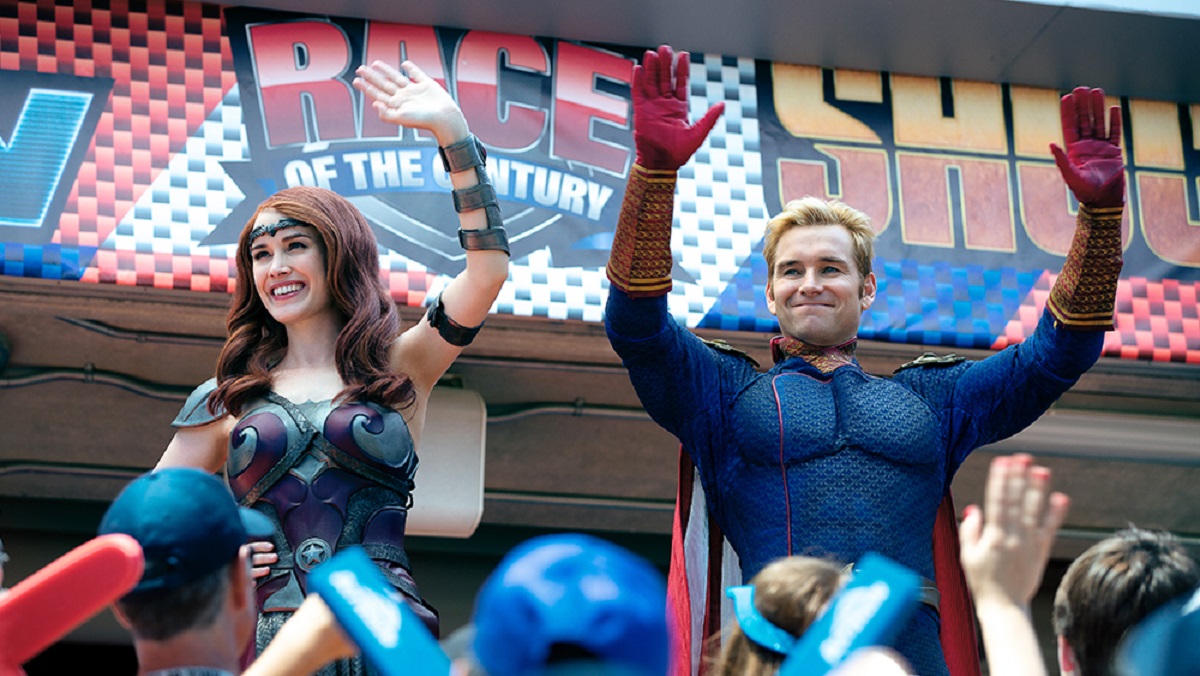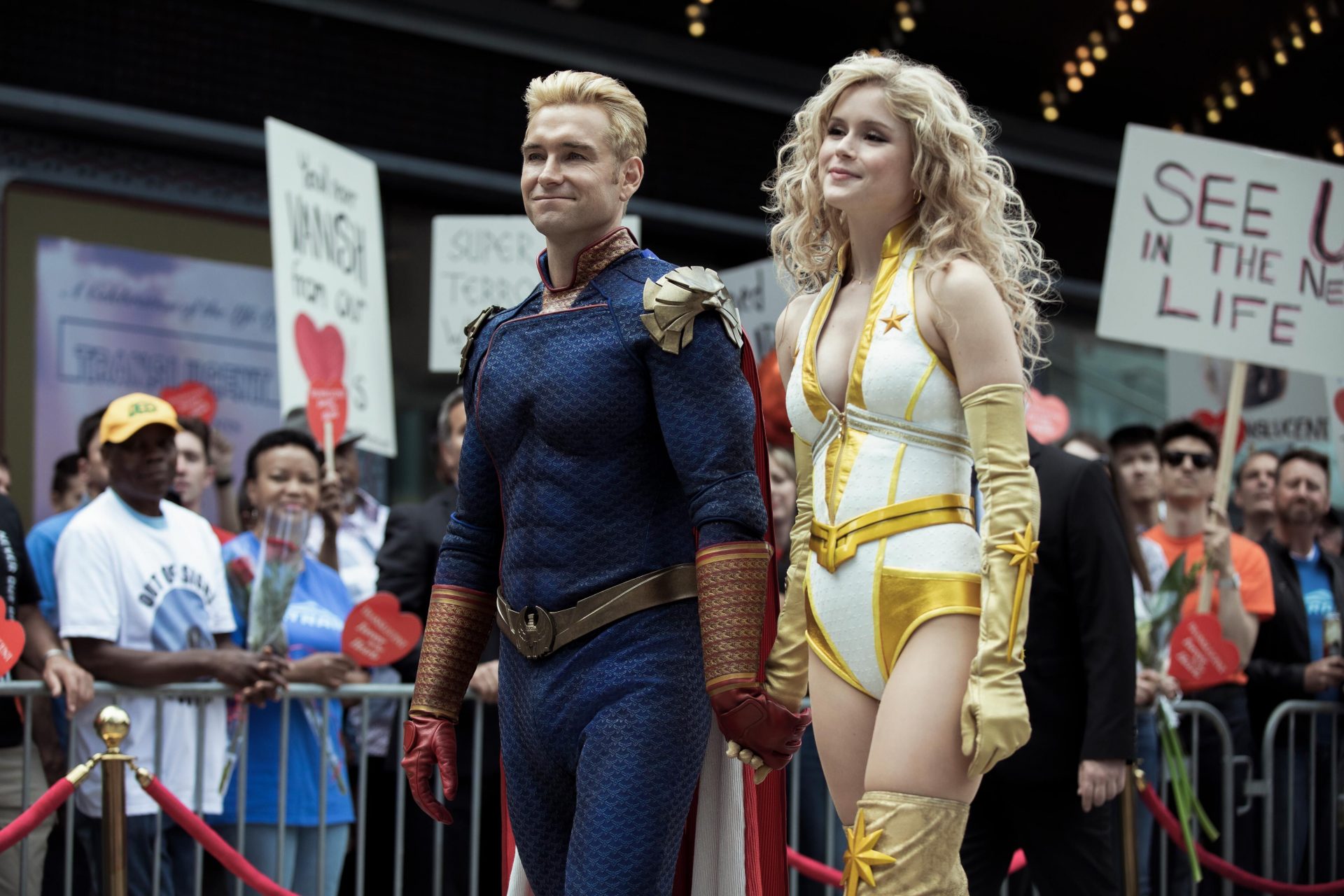“Girls Get it Done”
It’s the kind of slogan that gets plastered on journals, bumper stickers, and female-fronted election campaigns. Rah rah girl power packaged for the masses that will likely still inspire emotion in those of us who are used to being forgotten or misrepresented. Corporate progressiveness wrapped in the radical framing of revolution. And in the case of The Boys season two it’s the rallying cry behind the show’s biggest and most powerful messages about representation.
The first season of the lauded Amazon series adapted from the grim comic book of the same name already elevated the source material. It included more female representation. Take for instance the introduction of Starlight. In the comics, she is gruesomely gang raped in a panel that looks like a nightmarish gag comic. Showrunner Eric Kripke spent time and energy on building a team of people who could create something more thoughtful and timely for the TV adaptation. They instead switched the assault into one of coercion—a bleak power play by The Deep, The Seven’s pathetic hero. It’s the bare minimum of what we should expect, but it still made the superhero series stand out.

Prime Video
Starlight wasn’t a token female character. Then we have Queen Maeve, a tired, bitter, and complicit failure. And Elizabeth Shue’s brilliant portrayal of oedipal VP of Vought International Madelyn Stillwell. If those characters sound like archetypes, that is ostensibly what they were despite good intentions, smart writing, and sterling performances. But in the second season of The Boys, the team turns their searing satire on themselves and the greater idea of female representation. That includes the false corporate idea of girl power companies so often sell.
It can be hard to think critically about representation when we’re so desperate for it. As a white child who loved horror, I personally didn’t feel like I was underrepresented. Heroes like Sarah Connor, Ellen Ripley, and Sidney Prescott filled my cultural coffers. In the pages of comic books, I found plenty of incredible women from Storm to Catwoman, Starfire to Jean Grey, and many more. But that wasn’t the case for everyone. With the rise of superhero movies there’s been a hunger for more female-led stories. It’s something that the corporations that own these kind of characters have begun to see as a moneymaker. Though it might not be an exact analogue, Vought is surely the Disney of The Boys. They have a stranglehold on heroism and a corporate mindset obsessed with an image of acceptable progressiveness.

Marvel
The Marvel Cinematic Universe‘s idea of womanhood is a myopic one. Every woman is skinny and supermodel beautiful. And for most of the franchise’s history they were all white. The first key female character appeared as a secretary then girlfriend (Pepper Potts). The second showed up as an assistant and sultry love competitor for the secretary, but then the story revealed her as a sexy but barren assassin with a past that made her feel ashamed (Black Widow).
Black Panther arguably has the most eclectic and varied vision of what women can be, but that representation has rarely spread to the rest of the universe. It took eleven years to get to the first female-led MCU movie, Captain Marvel. Disney wrapped Captain Marvel‘s rah rah feminism in militarized messaging that wouldn’t have been out of place in The Boys. The story pushed young women to join the US Air Force just like their hero Carol.
Spoilers for The Boys Season 2 follow.
Enter The Boys season two. Starlight is front and center in her new skimpy costume as the authentic mouthpiece of The Seven. Vought PR has taken Starlight’s outspoken rant against The Deep and her own sexual assault and shaped it into a grotesque feel-good promotional tool. Although on the surface she’s playing the corporate game, Annie feels justified in her actions. She’s working from the inside to take down Vought and their sinister supervillains. Is it an interesting commentary on the compromises we’ll make to do the work? Or did The Boys just need a hero in a sexy costume? Narratively, her lack of pockets comes into play so we’ll give the team the benefit of the doubt.

Prime Video
Starlight seems to be the rare member of the cast with a true moral compass. She’s gaining agency in this season by abandoning all the men around her in order to take down Vought. But the arrival of a loud-mouthed Cool Girl, Stormfront (played by Aya Cash), throws the burgeoning hero’s surefootedness into doubt. Cool Girl doesn’t stand for the company’s corporate bull. She poses as the new feminist hero of The Seven.
“Being the Cool Girl means I am a hot, brilliant, funny woman who adores football, poker, dirty jokes, and burping, who plays video games, drinks cheap beer, loves threesomes and anal sex, and jams hot dogs and hamburgers into her mouth like she’s hosting the world’s biggest culinary gang bang while somehow maintaining a size 2, because Cool Girls are above all hot.” – Gillian Flynn, Gone Girl.
The Cool Girl archetype has haunted women around the world for decades. “You’re not like other girls,” men cry as they isolate you from anyone else that you know with a fake sense of superiority. It has nothing to do with you and everything to do with their own misogyny. It’s a trap many of us have fallen into without knowing better. And it’s one that The Boys‘ creators hope that you’ll stumble over once again when you meet the force of nature that is Stormfront.
Aya Cash crafts Stormfront into a hurricane of “relatable” Jennifer Lawrence style quips and comebacks. She doesn’t play ball. Aya won’t put up with misogynistic questions. She even tells Starlight to “be a b***h.” It would all seem very radical in 2012. The Boys uses it to lull viewers into a sense of temporary empowerment which is just as false as the “Girls Get it Done” scheme. It highlights just how trashy corporate-framed feminism can be, but The Boys has another gut check: the bigger message is that if you buy into Stormfront’s Cool Girl schtick you’re just as complicit in the faux-feminist bullsh*t as Vought.

Prime Video
If you’ve read the comics, know the history of Stormfront’s hometown of Portland, or have any knowledge of contemporary Neo-Nazi movements, you might have an inkling of what to come. But that doesn’t make the final moments of episode three any easier to watch. While she hunts Kimiko and Kenji, Stormfront throws them into a tenement building. A number of Black families call that building home. As Stormfront stalks the Supes she indiscriminately kills Black bystanders. The full truth of the character comes out at this point. Stormfront tortures Kenji and breaks his neck, calling him a violently racist name in the process. The Boys‘ big bombastic new female power icon is a virulent Neo-Nazi.
It’s a brutal awakening. The Boys is most concerned with grossing us out and entertaining us. However, this is an arc with a message. Mainstream ideas of feminism are widely built on white supremacy and protecting whiteness. Historically, white women held up as heroes were often vile racists concerned only with protecting what they perceived as white womanhood. Stormfront plays on that trend, presented as a hero for “women” but only revealing the vitally important precursor “white” when she begins to murder people of color for fun.

Prime Video
The scariest thing about Stormfront is that, like the recent rise of the alt-right, she understands branding. After murdering families from the New York block, she stands and gives emergency supplies to the survivors. She calls them “the true heroes.” In that moment she’s the human embodiment of a Pride flag painted on a cop car while they continue to kill Black trans people. Vought is a company built on medical experimentation—historically, we know who that affects and exploits the most. And in a way Stormfront is the most honest representation of the corp, especially as she’s more PR savvy than anyone.
Episodes two and three act as a one-two punch that knocks out any comfort around the idea of clean cut, easy to laud feminism. How often have we used phrases like “Girls Get it Done?” Heck, I recently wrote a book with a similar manifesto—that I like to think was a little more comprehensive and complex—that was just pulled from release. As entertainment journalists, how regularly have publicists encouraged us to celebrate that aspect of a given property? The Boys shines a light on those moments and the often vapid and relentlessly cynical nature of them before pulling the rug out and revealing the violent truth behind Stormfront’s Cool Girl persona.
You can watch the first three episodes of The Boys on Prime Video now.
Featured Image: Prime Video